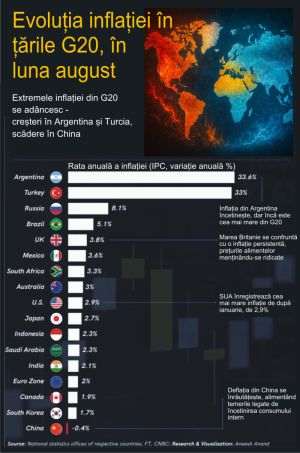• IMF: "The initiative of suspending the payment of debts needs to be extended until 2021"
• The president of the World Bank: "43 countries were benefiting from a suspension of the payment of debts of approximately 5 billion dollars, in mid-September"
The COVID-19 pandemic has pushed the level of debts to new highs and has thus brought new challenges to every country, but is hitting heavily particularly emerging markets and poor countries which are at risk of being confronted with a new economic crisis.
A report by the International Monetary Fund estimates that the median rate of debt in 2021 will in-crease by 20% of the GDP, compared to 2019, in advanced economies, with 10% of the GDP in emerging market economies and with approximately 7% in countries with low revenues. These in-creases are come on top of the debts that were already historically high. While many advanced economies still have the ability to borrow, emerging markets and countries with low revenues are facing far stricter limits in terms of their capacity to deal with additional debts.
According to the IMF, about half of countries with low income and several emerging market econ-omies were already at risk of a crisis amid the debts or were seeing a high risk, and the continued increase of their debts is alarming.
The IMF claims that there is a risk that when they start recovering after the deep marks left by the pandemic, many of these countries will be hit by a second wave of an economic crisis, launched implicitly by capital flight and by fiscal austerity. Preventing such a crisis can make the difference between a missed decade and a quick recovery which places countries on a trajectory of durable growth. As shown recently by IMF research, the expectation of the restructuring of debts until after the occurrence of a default is associated with larger decreases in GDP, investments, private sector lending and capital entries, than the preventive debt restructuring.
Due to the decisive actions of the central banks, the fiscal authorities, official bilateral creditors and the international financial institutions, ever since the first days of the pandemic no debt crisis has occurred yet. But the IMF warns that these actions, even though essential, are quickly becoming insufficient.
The report of the IMF states: "The initiatives taken so far are temporary by design. The initiative to suspend the service of the G20 debt, which was a very welcome response to a request by the IMF and the World Bank will expire at the end of this year.
Also, the IMF has granted approximately 31 billion dollars in emergency funding to 76 countries, including 47 low income countries, as well as the exemption from the debt service to the poorest countries of the Catastrophes Aid and Containment Trust. Given that needs will remain, developing countries will require additional funding at low cost in 2021 şi nu numai".
Moreover, the IMF warns that most measures so far have focused on liquidity - preserving coun-tries' access to funding, both from official sources and from the market. But as the crisis continues, solvency issues - the inability to pay off debts - are increasingly taking center stage.
"Preventing a debt crisis in developing countries requires urgent additional steps", the IMF explains.
The IMF claims that the initiative to suspend the payment of debts needs to be extended until 2021. Otherwise, its current recipients will be forced to resort to austerity measures to be able to resume the payment of debt, worsening the human suffering already caused by the pandemic. The expan-sion of the initiative should provide incentives for the early tackling of the unsustainable debt issues. For instance, the extension of the suspended debt repayment could be tied to the programs of the IMF and of the World Bank designed to reduce debt vulnerabilities.
Countries with debt vulnerabilities need to urgently use an approach combining the management of debt and the measures for restoring debt, says the IMF. "If debt is unsustainable, it should be re-structured, the sooner the better. If necessary, requests from the private sector should be included. Ignoring solvency issues only makes them worse".
The IMF report states: "Perhaps most important is the need to reform the international debt 'archi-tecture' that includes sovereign debt contracts, institutions such as the IMF and the Paris Club and policy frameworks that support orderly debt restructuring. The aim is to provide a rapid and deep enough debt reduction to the countries that need it, which will not not only those countries, but also the system as a whole. "
Still, the IMF claims that the current contractual framework has been to a great degree efficient in restructuring in the restructuring of sovereign debt, but the recent restructuring cases of Ecuador and Argentina show problems that need to be resolved, including the significant expansion of the diversity of commercial creditors, and the lack of debt transparency. For instance, the framework has proven to be less efficient for the restructuring of the growing volume of debts without bonds, as well as for collateral debt and debts with characteristics similar to the collateral. While the terms of such loans remain in most cases undisclosed, they seem to be extremely frequent in low reve-nue countries which export natural resources.
The report further shows that most of the official debts are currently owned by creditor countries that are not members of the Paris Club and do not follow its procedures. That makes it more diffi-cult than earlier the restructuring of debts owed to the official bilateral creditors and the insuring of a high rate of participation from official and private creditors alike.
The IMF thinks that debtors and creditors should continue to consolidate the contractual terms in order to help minimize economic disturbances when debtors are facing problems.
"The IMF and others have successfully promoted the passing of improved collective action clauses in international bonds. But there is still much left to be done. Similar dispositions are necessary to facilitate the orderly restructuring of debts without bonds. The clauses that reduce the debt or auto-matically suspend the debt service, such as in the case of natural disasters and other major eco-nomic shocks can also be useful", the report of the IMF further states.
The IMF also claims that debt transparency should be increased. Without knowing what a country owes what and under what terms, lenders can not make well-informed lending decisions. They will also be reluctant to participate in debt restructuring, unless they know the terms granted to other lenders.
The report further states: "Official bilateral creditors should agree on a common approach of the restructuring of the official bilateral debts. It should be acceptable both for the members of the Paris Club, as well as for others. The restructurings could include a common terms sheet that requires the debtor to transparently establish its debts and request restructuring agreements from all of its credi-tors - official as well as private - under comparable terms. Such an approach would seek to ensure the exchange of information and the equitable burden sharing between all the creditors. In doing so, that would increase participation and avoid costly delays.
Not all of these reforms would have an immediate impact. Even though time will be necessary for the contractual improvements to affect the debt inventory, a shared restructuring approach which would include all the official bilateral creditors - currently discussed in the G20 - could make a criti-cal difference nearly right away".
The IMF announced that it is working hard to prevent a debt crisis, supporting its members with po-litical counseling, financing and capabilities growth.
"We will continue to provide the exemption from debt servicing to the poorest countries from the Catastrophes Aid and Containment Trust. We are also promoting debt transparency, including through a stronger policy concerning debt limits, providing technical support for the management of debt and we are collaborating with G20 for expanding the initiative for the suspension of the debt payment. We support t he coordination between debtors and creditors and the restructuring of debts by analyzing the action for restoring the durability of debts and by making our financial support con-ditional on the high involvement of the creditors", the institution states.
The IMF also points out that the whole world is at a critical stage and should not remain inactive in expectation of a crisis.
"[The world] needs to revise its weapons arsenal - a task which we have undertaken with the IMF. It should also do everything possible to prevent, and if necessary, another pile of sovereign debt. The alternative could have large scale implications, which would seriously affect economies. Low reve-nue countries are particularly exposed to the risk, and their people could suffer the most if a sover-eign debt crisis appears. The key-steps are the expansion of the aforementioned initiative to sus-pend the servicing of debt, the approaching of the vulnerability of countries' debts and the building of a more solid debt architecture. We call upon all the interested parties to do their part in reducing the risk of a catastrophe and open the path to a safer financial system", the IMF says.
The issue of debts has not been approached only by the IMF. Pope Francis had a speech during the pandemic which even called for debt cancellation.
In his message during the Easter Holiday, Pope Francis said: "At the same time, international sanc-tions that prevent the targeted countries from providing adequate support to their own citizens, should be removed, and every state should be helped to become able to deal with the greater needs of the current times, through a reduction, if not outright cancelation of the debt that pushes on the balance sheets of the poorer states".
During that same Sunday, Pakistani prime-minister Imran Khan also asked for the wiping of debts: "The global initiative proposed [ed. note: by Pakistan, to the UN Secretary General] seeks to lay the foundation of an urgent reduction of developing countries' debt, upon their own request and without onerous demands".
At the time, Imran Khan stressed in his request that the overly indebted countries are faced with a "lack of fiscal room" which has inhibited their efforts to prevent the spread of the coronavirus.
The World Bank has also joined its voice to that of the IMF since the beginning of the pandemic and the two financial institutions have argued for debt exemption for distressed countries.
The president of the World Bank, David Malpass, returned to that idea in a speech held at the Fi-nance and Management School of Frankfurt on Monday.
He once again reiterated the need for suspending the repayment of debts, in particular in the case of poor countries.
"I am once again warning on the urgency of dealing with poverty, inequalities, human capital, debt reduction, climate change the economic adaptability, as elements in ensuring a resilient recovery. This crisis has demonstrated why history doesn't repeat in the exact same way - because humanity learns from its mistakes. So far, the pandemic has not sparked the devastating secondary effects of the prior crashes - hyperinflation, deflation, nor widespread hunger. Even if the loss of income and the inequality of impact have been worse than in most crises in the past, the global economic response, so far, has been a lot worse than we would have expected in the beginning of this crisis", said David Malpass.
He added that the response to development will have to be expanded and intensified, both where the sanitary emergency situation is concerned, as well as the efforts to help countries come up with efficient aid systems and recovery plans.
"A greater cooperation will allow us to share our knowledge and develop and apply more efficient solutions quicker. That will allow innovators to develop a vaccine that defeats the virus and restore people's confidence. By working through every channel, my hope - and my belief - is that we can shorten the recession and we can build a solid base for a more durable prosperity model - one which can lift all countries and everyone", said the president of the World Bank.










































